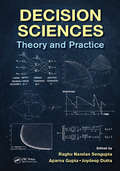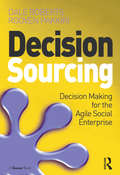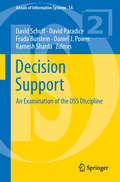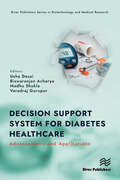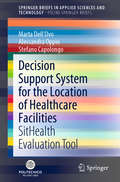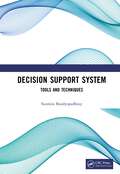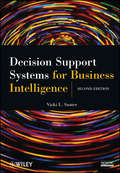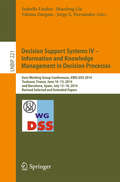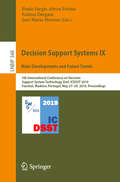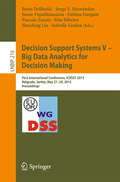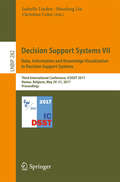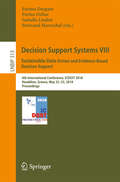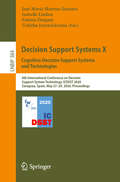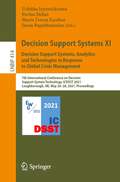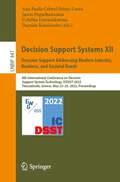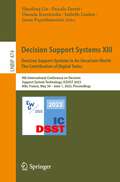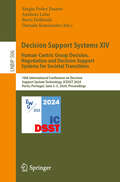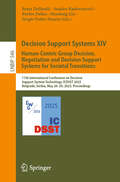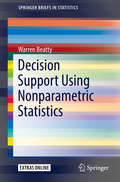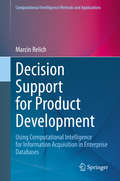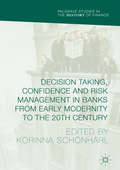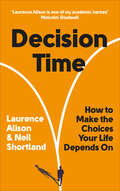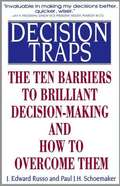- Table View
- List View
Decision Sciences: Theory and Practice
by Raghu Nandan Sengupta, Aparna Gupta and Joydeep DuttaThis handbook is an endeavour to cover many current, relevant, and essential topics related to decision sciences in a scientific manner. Using this handbook, graduate students, researchers, as well as practitioners from engineering, statistics, sociology, economics, etc. will find a new and refreshing paradigm shift as to how these topics can be put to use beneficially. Starting from the basics to advanced concepts, authors hope to make the readers well aware of the different theoretical and practical ideas, which are the focus of study in decision sciences nowadays. It includes an excellent bibliography/reference/journal list, information about a variety of datasets, illustrated pseudo-codes, and discussion of future trends in research. Covering topics ranging from optimization, networks and games, multi-objective optimization, inventory theory, statistical methods, artificial neural networks, times series analysis, simulation modeling, decision support system, data envelopment analysis, queueing theory, etc., this reference book is an attempt to make this area more meaningful for varied readers. Noteworthy features of this handbook are in-depth coverage of different topics, solved practical examples, unique datasets for a variety of examples in the areas of decision sciences, in-depth analysis of problems through colored charts, 3D diagrams, and discussions about software.
Decision Sourcing: Decision Making for the Agile Social Enterprise
by Dale Roberts Rooven PakkiriWe are living in the post-information age, the era of so-called 'Big Data'. It is a practical possibility for corporations to report, chart and analyse every action, transaction and click that happens inside and outside their business. In Decision Sourcing Roberts and Pakkiri examine what this means to organisational decision making. They explode the myth that good decisions need only be informed ones through an examination into how business really make choices. They lay bare the poverty of decision making processes in today’s corporate world and offer fresh and fascinating insight into how social tools are providing new sources of information, how they are challenging hierarchy and how they are providing opportunities for growth and agility through aligned and inclusive decision making. This book is for those organisations that want to get beyond the corporate Facebook account and are ready for the next bold step. It is for those businesses that want to engage their workforce and their customers in collaborative relationships that are at the heart of the successful social enterprise.
Decision Support
by David Paradice Ramesh Sharda Daniel J. Power David Schuff Frada BursteinThis volume of Annals of Information Systems will acknowledge the twentieth anniversary of the founding of the International Society for Decision Support Systems (ISDSS) by documenting some of the current best practices in teaching and research and envisioning the next twenty years in the decision support systems field. The volume is intended to complement existing DSS literature by offering an outlet for thoughts and research particularly suited to the theme of describing the next twenty years in the area of decision support. Several subthemes are planned for the volume. One subtheme draws on the assessments of internationally known DSS researchers to evaluate where the field has been and what has been accomplished. A second subtheme of the volume will be describing the current best practices of DSS research and teaching efforts. A third subtheme will be an assessment by top DSS scholars on where the DSS discipline needs to focus in the future. The tone of this volume is one of enthusiasm for the potential contributions to come in the area of DSS; contributions that must incorporate an understanding of what has been accomplished in the past, build on the best practices of today, and be be integrated into future decision making practices. The primary questions raised by this volume are: What will information systems-based decision support entail in twenty years? What research is needed to realize the envisioned future of information systems-based decision support? How will the teaching of information systems-based decision support change over the next twenty years? What are the best practices of teaching in the decision support area that can be leveraged to best disseminate DSS knowledge advances to students and practitioners?
Decision Support System for Diabetes Healthcare: Advancements and Applications (River Publishers Series in Biotechnology and Medical Research)
by Varadraj Gurupur Biswaranjan Acharya Usha Desai Madhu ShuklaDecision Support System for Diabetes Healthcare: Advancements and Applications is a comprehensive guide to the cutting-edge technology transforming diabetes management. In this book, leading experts in the field explore how decision support systems (DSS) are revolutionizing healthcare practices, particularly in diabetes care. From advanced data analytics to personalized treatment recommendations, this book delves into the innovative solutions that are reshaping how healthcare providers approach diabetes management. Readers will gain insights into the latest developments in DSS technology, including predictive modeling, machine learning algorithms, and real-time monitoring systems, all designed to enhance patient outcomes and improve quality of life. With a focus on practical applications, Decision Support System for Diabetes Healthcare offers case studies and examples of successful DSS implementations across various healthcare settings. Whether you're a healthcare professional, researcher, or technology enthusiast, this book provides invaluable insights into the future of diabetes care. By exploring the intersection of technology and healthcare, readers will discover how DSS is empowering both patients and providers to make informed decisions, optimize treatment plans, and ultimately, transform the way diabetes is managed on a global scale.
Decision Support System for the Location of Healthcare Facilities: SitHealth Evaluation Tool (SpringerBriefs in Applied Sciences and Technology)
by Stefano Capolongo Alessandra Oppio Marta Dell'OvoThe book examines an integrated approach for addressing decisions about the location of healthcare facilities. Supported by Geographic Information Systems (GIS) and Multi-Criteria Decision Analysis (MCDA), the approach provides comprehensive information on territory, taking into account the spatial dimensions. Due to the multiple criteria involved, site selection for urban facilities is a crucial topic in planning decision processes, especially for healthcare facilities. Healthcare provision policies generally fail to address the distribution of facilities within cities, entrusting decisions to various stakeholders. Moreover current evaluation tools focus on the intrinsic performances of healthcare structures, disregarding the extrinsic characteristics, namely those related to the location. Starting with a cross-disciplinary literature review, the book describes a multi-methodological approach for decision-making regarding the location of healthcare facilities, and presents an innovative evaluation tool that simultaneously considers functional, locational, environmental and economic issues, providing a comprehensive overview of the areas under investigation.
Decision Support System: Tools and Techniques
by Susmita BandyopadhyayThis book presents different tools and techniques used for Decision Support Systems (DSS), including decision tree and table, and their modifications, multi-criteria decision analysis techniques, network tools of decision support, and various case-based reasoning methods supported by examples and case studies. Latest developments for each of the techniques have been discussed separately, and possible future research areas are duly identified as intelligent and spatial DSS. Features: Discusses all the major tools and techniques for Decision Support System supported by examples. Explains techniques considering their deterministic and stochastic aspects. Covers network tools including GERT and Q-GERT. Explains the application of both probability and fuzzy orientation in the pertinent techniques. Includes a number of relevant case studies along with a dedicated chapter on software. This book is aimed at researchers and graduate students in information systems, data analytics, operation research, including management and computer science areas.
Decision Support Systems For Business Intelligence
by Vicki L. SauterPraise for the First Edition "This is the most usable decision support systems text. [i]t is far better than any other text in the field" --Computing Reviews Computer-based systems known as decision support systems (DSS) play a vital role in helping professionals across various fields of practice understand what information is needed, when it is needed, and in what form in order to make smart and valuable business decisions. Providing a unique combination of theory, applications, and technology, Decision Support Systems for Business Intelligence, Second Edition supplies readers with the hands-on approach that is needed to understand the implications of theory to DSS design as well as the skills needed to construct a DSS. This new edition reflects numerous advances in the field as well as the latest related technological developments. By addressing all topics on three levels--general theory, implications for DSS design, and code development--the author presents an integrated analysis of what every DSS designer needs to know. This Second Edition features: Expanded coverage of data mining with new examples Newly added discussion of business intelligence and transnational corporations Discussion of the increased capabilities of databases and the significant growth of user interfaces and models Emphasis on analytics to encourage DSS builders to utilize sufficient modeling support in their systems A thoroughly updated section on data warehousing including architecture, data adjustment, and data scrubbing Explanations and implications of DSS differences across cultures and the challenges associated with transnational systems Each chapter discusses various aspects of DSS that exist in real-world applications, and one main example of a DSS to facilitate car purchases is used throughout the entire book. Screenshots from JavaScript® and Adobe® ColdFusion are presented to demonstrate the use of popular software packages that carry out the discussed techniques, and a related Web site houses all of the book's figures along with demo versions of decision support packages, additional examples, and links to developments in the field. Decision Support Systems for Business Intelligence, Second Edition is an excellent book for courses on information systems, decision support systems, and data mining at the advanced undergraduate and graduate levels. It also serves as a practical reference for professionals working in the fields of business, statistics, engineering, and computer technology.
Decision Support Systems IV - Information and Knowledge Management in Decision Processes: Euro Working Group Conferences, EWG-DSS 2014, Toulouse, France, June 10-13, 2014, and Barcelona, Spain, July 13-18, 2014, Revised Selected and Extended Papers (Lecture Notes in Business Information Processing #221)
by Jorge E. Hernández Fátima Dargam Shaofeng Liu Isabelle LindenThis book contains extended and revised versions of a set of selected papers from two events organized by the Euro Working Group on Decision Support Systems (EWG-DSS), which were held in Toulouse, France and Barcelona, Spain, in June and July 2014. Overall, 8 papers were accepted for publication in this edition after a rigorous review process through at least three internationally known experts from the EWG-DSS Program Committee and external invited reviewers. The selected papers focus on knowledge management and sharing, and on information models developed to support various decision processes.
Decision Support Systems IX: 5th International Conference on Decision Support System Technology, EmC-ICDSST 2019, Funchal, Madeira, Portugal, May 27–29, 2019, Proceedings (Lecture Notes in Business Information Processing #348)
by Fatima Dargam José Maria Moreno Paulo Sérgio Abreu FreitasThis book constitutes the proceedings of the 5th International Conference on Decision Support Systems Technologies, ICDSST 2019, held in Madeira, Portugal, in May 2019. This year the conference is a EURO mini conference and therefore has a slightly different acronym: "EmC-ICDSST 2019". The EWG-DSS series of International Conference on Decision Support System Technology (ICDSST), starting with ICDSST 2015 in Belgrade, was planned to consolidate the tradition of annual events organized by the EWG-DSS in offering a platform for European and international DSS communities, comprising the academic and industrial sectors, to present state-of-the-art DSS research and developments, to discuss current challenges that surround decision-making processes, to exchange ideas about realistic and innovative solutions, and to co-develop potential business opportunities. The main topic of this year’s conference was “Main Developments and Future Trends”. The 11 papers presented in this volume were carefully reviewed and selected from 59 submissions. They were organized in topical sections named: decision support systems in societal issues; decision support systems in industrial and business applications; and advances in decision support systems’ methods and technologies.
Decision Support Systems V - Big Data Analytics for Decision Making
by Pascale Zaraté Boris Delibašić Jorge E. Hernández Jason Papathanasiou Fátima Dargam Rita Ribeiro Shaofeng Liu Isabelle LindenThis book constitutes the refereed proceedings of the First International Conference on Decision Support Systems Technology, ICDSST 2015, held in Belgrade, Serbia, in May 2015. The theme of the event was "Big Data Analytics for Decision-Making" and it was organized by the EURO (Association of European Operational Research Societies) working group of Decision Support Systems (EWG-DSS). The eight papers presented in this book were selected out of 26 submissions after being carefully reviewed by at least three internationally known experts from the ICDSST 2015 Program Committee and external invited reviewers. The selected papers are representative of current and relevant research activities in the area of decision support systems, such as decision analysis for enterprise systems and non-hierarchical networks, integrated solutions for decision support and knowledge management in distributed environments, decision support system evaluations and analysis through social networks, and decision support system applications in real-world environments. The volume is completed by an additional invited paper on big data decision-making use cases.
Decision Support Systems VII. Data, Information and Knowledge Visualization in Decision Support Systems: Third International Conference, ICDSST 2017, Namur, Belgium, May 29-31, 2017, Proceedings (Lecture Notes in Business Information Processing #282)
by Isabelle Linden, Shaofeng Liu and Christian ColotThis book constitutes the proceedings of the Third International Conference on Decision Support Systems, ICDSST 2017, held in Namur, Belgium, in May 2017. The EWG-DSS series of the International Conference on Decision Support System Technology (ICDSST) offers a platform for European and international DSS communities, comprising the academic and industrial sectors, in order to present state-of-the-art DSS research and developments, to discuss current challenges that surround decision-making processes, to exchange ideas about realistic and innovative solutions, and to co-develop potential business opportunities. The main topic of this year’s conference was “Data, Information and Knowledge Visualization in Decision Making”. The 13 papers presented in this volume were carefully reviewed and selected from 53 submissions. They were organized in topical sections named: visualization case studies; visualization perspectives; analytics and decision; and Multi-Criteria Decision Making.
Decision Support Systems VIII: 4th International Conference, ICDSST 2018, Heraklion, Greece, May 22–25, 2018, Proceedings (Lecture Notes in Business Information Processing #313)
by Isabelle Linden Pavlos Delias Fatima Dargam Bertrand MareschalThis book constitutes the proceedings of the 4th International Conference on Decision Support Systems, ICDSST 2018, held in Heraklion, Greece, in May 2018. The main topic of this year’s conference was “Sustainable Data-Driven and Evidence Based Decision Support”. The 15 papers presented in this volume were carefully reviewed and selected from 71 submissions. They were organized in topical sections named: decision support systems for a sustainable society; decision support systems serving the public; decision support systems in management and organization; and advances in decision support systems’ technologies and methods. The EWG-DSS series of International Conference on Decision Support System Technology (ICDSST), starting with ICDSST 2015 in Belgrade, were planned to consolidate the tradition of annual events organized by the EWG-DSS in offering a platform for European and international DSS communities, comprising the academic and industrial sectors, to present state-of-the-art DSS research and developments, to discuss current challenges that surround decision-making processes, to exchange ideas about realistic and innovative solutions, and to co-develop potential business opportunities.
Decision Support Systems X: 6th International Conference on Decision Support System Technology, ICDSST 2020, Zaragoza, Spain, May 27–29, 2020, Proceedings (Lecture Notes in Business Information Processing #384)
by Isabelle Linden Fatima Dargam José María Moreno-Jiménez Uchitha JayawickramaThis book constitutes the proceedings of the 6th International Conference on Decision Support Systems Technologies, ICDSST 2020, organised in Zaragoza, Spain, in May 2020. The conference was held online only due to the Corona pandemic. The EWG-DSS series of International Conference on Decision Support System Technology (ICDSST) is planned to consolidate the tradition of annual events organized by the EWG-DSS in offering a platform for European and international DSS communities, comprising the academic and industrial sectors, to present state-of-the-art DSS research and developments, to discuss current challenges that surround decision-making processes, to exchange ideas about realistic and innovative solutions, and to co-develop potential business opportunities. The main topic of this year’s conference was “Cognitive Decision Support Systems and Technologies”. The 13 papers presented in this volume were carefully reviewed and selected from 51 submissions. They were organized in topical sections named: methodological contributions; case studies and applications; and overview (on the current state and future trends of DSS, BI, and data analytics research).
Decision Support Systems XI: 7th International Conference on Decision Support System Technology, ICDSST 2021, Loughborough, UK, May 26–28, 2021, Proceedings (Lecture Notes in Business Information Processing #414)
by Jason Papathanasiou Pavlos Delias Uchitha Jayawickrama María Teresa EscobarThis book constitutes the proceedings of the 7th International Conference on Decision Support Systems Technologies, ICDSST 2021, held during May 26-28, 2021. The conference was planned to take place in Loughborough, UK, and changed to an online format due to the COVID-19 pandemic.The EWG-DSS series of International Conference on Decision Support System Technology (ICDSST) is planned to consolidate the tradition of annual events organized by the EWG-DSS in offering a platform for European and international DSS communities, comprising the academic and industrial sectors, to present state-of-the-art DSS research and developments, to discuss current challenges that surround decision-making processes, to exchange ideas about realistic and innovative solutions, and to co-develop potential business opportunities. The main aim of this year’s conference is to investigate the role DSS and related technologies can play in mitigating the impact of pandemics and post-crisis recovery. The 10 papers presented in this volume were carefully reviewed and selected from 44 submissions. They were organized in two topical sections named: multiple criteria approaches and advances in decision support systems’ technologies and methods.
Decision Support Systems XII: 8th International Conference on Decision Support System Technology, ICDSST 2022, Thessaloniki, Greece, May 23–25, 2022, Proceedings (Lecture Notes in Business Information Processing #447)
by Jason Papathanasiou Uchitha Jayawickrama Ana Paula Cabral Seixas Costa Daouda KamissokoThis book constitutes the proceedings of the 8th International Conference on Decision Support Systems Technologies, ICDSST 2022, held during May 23-25, 2022.The EWG-DSS series of International Conference on Decision Support System Technology (ICDSST) is planned to consolidate the tradition of annual events organized by the EWG-DSS in offering a platform for European and international DSS communities, comprising the academic and industrial sectors, to present state-of-the-art DSS research and developments, to discuss current challenges that surround decision-making processes, to exchange ideas about realistic and innovative solutions, and to co-develop potential business opportunities. The main aim of this year’s conference is to investigate the role DSS and related technologies can play in mitigating the impact of pandemics and post-crisis recovery. The 15 papers presented in this volume were carefully reviewed and selected from 46 submissions. They were organized in topical sections as follows: decision support addressing modern industry; decision support addressing business and societal needs, and multiple criteria approaches.
Decision Support Systems XIII. Decision Support Systems in An Uncertain World: 9th International Conference on Decision Support System Technology, ICDSST 2023, Albi, France, May 30 – June 1, 2023, Proceedings (Lecture Notes in Business Information Processing #474)
by Pascale Zaraté Jason Papathanasiou Shaofeng Liu Isabelle Linden Daouda KamissokoThis book constitutes the proceedings of the 9th International Conference on Decision Support Systems Technologies, ICDSST 2023, held during May 30 – June 1, 2023.The EWG-DSS series of International Conference on Decision Support System Technology (ICDSST) is planned to consolidate the tradition of annual events organized by the EWG-DSS in offering a platform for European and international DSS communities, comprising the academic and industrial sectors, to present state-of-the-art DSS research and developments, to discuss current challenges that surround decision-making processes, to exchange ideas about realistic and innovative solutions, and to co-develop potential business opportunities. The main theme of this year was “Decision Support Systems in An Uncertain World: The Contribution of Digital Twins”. The 21 papers presented in this volume were carefully reviewed and selected from 65 submissions. They were organized in topical sections as follows: DSS models, methods, and tools; DSS for business performance and stakeholders; DSS applications for sustainability in health, energy and transportation; and DSS users and successful adoption.
Decision Support Systems XIV. Human-Centric Group Decision, Negotiation and Decision Support Systems for Societal Transitions: 10th International Conference on Decision Support System Technology, ICDSST 2024, Porto, Portugal, June 3–5, 2024, Proceedings (Lecture Notes in Business Information Processing #506)
by Boris Delibašić António Lobo Daouda Kamissoko Sérgio Pedro DuarteThis book constitutes the proceedings of the 10th International Conference on Decision Support Systems Technologies, ICDSST 2024, held in June 2024. The EWG-DSS series of International Conference on Decision Support System Technology (ICDSST) is planned to consolidate the tradition of annual events organized by the EWG-DSS in offering a platform for European and international DSS communities, comprising the academic and industrial sectors, to present state-of-the-art DSS research and developments, to discuss current challenges that surround decision-making processes, to exchange ideas about realistic and innovative solutions, and to co-develop potential business opportunities. This year the main topic was: Human-Centric Group Decision, Negotiation and Decision Support Systems for Societal Transitions. The 10 full papers included in these proceedings were carefully reviewed and selected from 29 submissions. They have been organized in topical sections as follows: Decision support tools and methods; and decision factors.
Decision Support Systems XIV. Human-Centric Group Decision, Negotiation and Decision Support Systems for Societal Transitions: 11th International Conference on Decision Support System Technology, ICDSST 2025, Belgrade, Serbia, May 26–29, 2025, Proceedings (Lecture Notes in Business Information Processing #546)
by Boris Delibašić Shaofeng Liu Pavlos Delias Sérgio Pedro Duarte Sandro RadovanovićThis book constitutes the proceedings of the 11th International Conference on Decision Support Systems Technologies, ICDSST 2025, held in Belgrade, Serbia, in May 2025. The EWG-DSS series of International Conference on Decision Support System Technology (ICDSST) is planned to consolidate the tradition of annual events organized by the EWG-DSS in offering a platform for European and international DSS communities, comprising the academic and industrial sectors, to present state-of-the-art DSS research and developments, to discuss current challenges that surround decision-making processes, to exchange ideas about realistic and innovative solutions, and to co-develop potential business opportunities. This year the main focus was: Decision Support System Technology in the AI Era. The 10 full papers included in these proceedings were carefully reviewed and selected from 39 submissions. They have been organized in topical sections as follows: Decision support systems; artificial intelligence and machine learning; and decision support system challenges.
Decision Support Using Nonparametric Statistics
by Warren BeattyThis concise volume covers nonparametric statistics topics that most are most likely to be seen and used from a practical decision support perspective. While many degree programs require a course in parametric statistics, these methods are often inadequate for real-world decision making in business environments. Much of the data collected today by business executives (for example, customer satisfaction opinions) requires nonparametric statistics for valid analysis, and this book provides the reader with a set of tools that can be used to validly analyze all data, regardless of type. Through numerous examples and exercises, this book explains why nonparametric statistics will lead to better decisions and how they are used to reach a decision, with a wide array of business applications. Online resources include exercise data, spreadsheets, and solutions.
Decision Support for Product Development: Using Computational Intelligence for Information Acquisition in Enterprise Databases (Computational Intelligence Methods and Applications)
by Marcin RelichThis book describes how to use computational intelligence and artificial intelligence tools to improve the decision-making process in new product development. These approaches, including artificial neural networks and constraint satisfaction solutions, enable a more precise prediction of product development performance compared to widely used multiple regression models. They support decision-makers by providing more reliable information regarding, for example, project portfolio selection and project scheduling.The book is appropriate for computer scientists, management scientists, students and practitioners engaged with product innovation and computational intelligence applications.
Decision Taking, Confidence and Risk Management in Banks from Early Modernity to the 20th Century
by Korinna SchönhärlThis book offers 14 contributions that examine key questions concerning bankers#65533; decision making, their confidence in partners and customers, and their risk management practices from Early Modernity to the 20th century. It explores various mechanisms of banks' decision taking, how they were established and how they changed over time. Specific chapters also analyze the types of risk management techniques used and the extent of their success; factors that contributed to the constitution of confidence and factors that damaged it; and methods that banking historians can use to analyze and describe bankers#65533; risk management and decision making. The volume features varied methodological approaches for historical research (from system theory to behavioural finance, from new institutional economics to praxeology, from convention theory to network analysis). The different methodological approaches are put to the test in case studies based on archive material from five hundred years of banking (from Early Modern European banking networks to international computerization) in order to connect banking history more closely to political and cultural history.
Decision Time: How to Make the Choices Your Life Depends On
by Laurence Alison Neil ShortlandAn inspirational self-help book to identify and fight off the common enemies of good decision-making—inertia, procrastination, and indecision—and empower you to make the choices that matter the most using growth mindset.Should I change careers? Is it time to end my relationship? Can I move halfway across the world?We have to make choices every day, big and small, but it's the life-changing ones that often cause us to freeze or react too quickly, without thinking. What can we do differently?Laurence Alison and Neil Shortland have spent over 20 years helping soldiers, police officers, doctors, and other professionals in high-stakes environments make tough decisions when lives are on the line. In Decision Time, they show us how those same decision-making techniques apply to everyday life, whether that's deciding to take a new job or change careers later in life, end a relationship, move across the world, or declare your undying love for your best friend.Highly accessible and interactive, Decision Time will guide you through each step of the decision-making process so next time you a find yourself at a crossroads, you'll be able to make your way with confidence.Praise for Decision Time:"A highly readable and entertaining book... The authors have managed the trick of applying their work with military and security professionals to the high-consequence choices people face in everyday life. This is a thought-provoking and stimulating contribution."—Gary Klein, author of Seeing What Others Don't and The Power of Intuition
Decision Traps: Ten Barriers to Brilliant Decision-Making and How to Overcome Them
by J. Edward Russo Paul H. SchoemakerFrom the Book Jacket: Make Every Decision Your Best Decision Executives rate decision-making ability as the most important business skill, but few people have the training they need to make good decisions consistently. Becoming a good decision-maker is like training to be a top athlete: Just as the best coaches use training methods to help athletes develop proper techniques and avoid mistakes, Dr. J. Edward Russo and Dr. Paul I. H. Schoemaker have developed a program that can help you avoid "decision traps"-the ten common decision-making errors that most people make over and over again. Dr. Russo and Dr. Schoemaker have improved the decision- making skills of thousands of Fortune 500 executives with this program. Now you can use their decision-making techniques to make sure that your last bad decision was your last bad decision.
Decision Trees
by Robin Greenwood Lucy WhiteThis case introduces decision analysis. Using a simple example, it illustrates the use of probability trees and decision trees as tools for solving business problems.
Decision Trees for Decision Making
by John F. MageeThe "decision tree" is an analytical tool which helps business managers resolve uncertainties in making investment decisions. It clarifies the choices, risks, objectives, monetary gains, and information needs involved. Whether simple or complex in layout, the decision tree always combines action choices with different possible events or the results of action affected by uncontrollable circumstances. The decision-tree helps management to determine which alternative, at any particular point, yields the greatest monetary gain.
